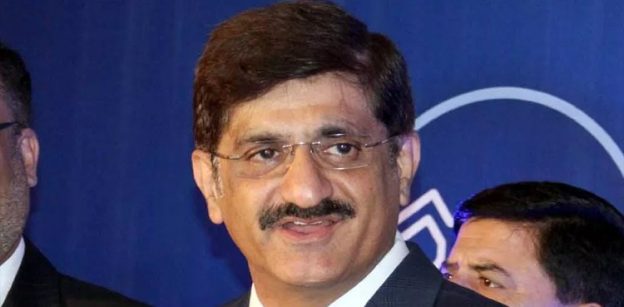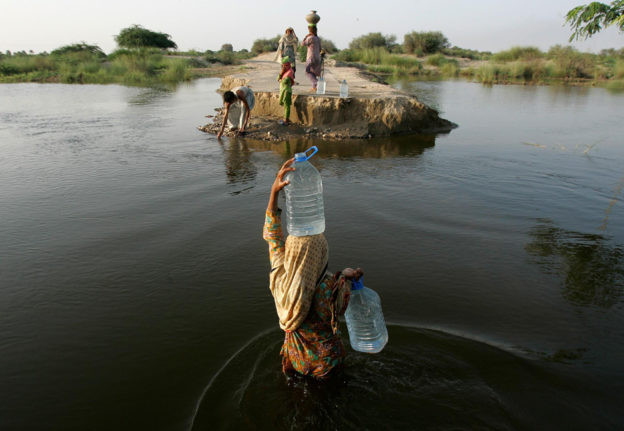By: Manzoor Shaikh
Bhasha Dam – CM Murad Ali Shah puts forward his reservations on the dam.
Sindh seems to have given a second thought to its standpoint on Bhasha dam for which country’s Chief Justice has himself tightened his belt and even the army chief has donated Rs.1 billion in a fund set up for the construction of dams in the country.
Sindh’s official opinion has been in favor of Bhasha Dam and the previous government in the province had given its assent on the construction of the dam when it came in the Council of Common Interests (CCI)—a constitutional body to decide on the fate of controversial issues in Pakistan.
Sindh is among leading Kalabag Dam with tooth and nail and has adopted three resolutions against it in the Sindh Assembly. Any talk about constructing new dams is always a great source of tension in the province whose economy is heavily dependent on agriculture for which irrigation is the basic ingredient.
Syed Murad Ali Shah who still says he is not against the construction of the Bhasha dam but has reservations on two counts.
Firstly, the location of the dam which, as Shah sees is situated in a seismic zone and, secondly, the availability of water in the system. “How the dam could be filled if there is no water available for filling the dam in the system. Naturally, it would not be filled with air”, he asked while talking to media in Karachi on September 11.
Shah was not alone talking to reporters at the mausoleum of Quaid-i-Azam, he was flanked by Governor Imran Ismail, picked up by his rival PTI in the province. Thus, he successfully sent his message as to what is going on in Sindh government’s mind.
The destination of his message is not the Prime Minister’s House only, it also transmitted to yet another institution which Shah’s party claims is targeting its top leadership.
Himself a civil engineer of a repute, Sindh’s chief minister has a rationale for raising objections of which one is known to all that the project site lies in the seismic area. For the second reservation, his argument is based on water releases data downstream of Kotri. There is no water available to fill the dam in the River Indus system, he claims.
Strengthening his claim with water availability data spread over a decade, he says 25 MAF is required to go downstream Kotri according to him. Even if a minimum 10 MAF is set as a quantity which must go to the sea, still only 7.7 MAF was released last year, he says.
Shah fears that the sea would keep encroaching further upon nearby villages of coastal districts of Thatta and Badin if 25 MAF water is not released downstream Kotri. The data verbally shared by him says the releases downstream Kotri during 6 years of the last decade has been less than 10 MAF per annum. In the remaining four years it varies between 2 to 4 MAF.
Sindh’s official data says over 1.2 million acres of land in Thatta district has already been swallowed by the sea.
The Indus delta, once a thriving habitat of hundreds of different species of marine and wildlife is now on the verge of devastation because of depleting river supplies downstream Kotri.
Water experts found this year that the Indus Delta—the 5th largest in the world—has shrunk from 12,900 square kilometers to just 1,000 square kilometers raising a serious alarm in a 200-year period.
The contraction of the delta has reached 92 percent, shows a study conducted by a team of five academics of the US Aid-supported Centre for Advanced Studies in Water (USPCASW) at Mehran University of Engineering and Technology (MUET), Jamshoro.
The study led by a researcher Prof Dr. Altaf Ali Siyal took 15 months to establish the facts claims that in the last 45 years, the sea has swallowed 42,609 hectares in its tidal floodplain.’ (See detailed story in Engineering Review March 16-31, 2018 Issue)
Chief Minister says “We have to protect the delta by releasing river water downstream Kotri. Water releases downstream Kotri from 1922 to this date is available with Sindh government and it can be verified.”
Murad Ali Shah’s reservations apart, Pakistan has been recognized as a water stressed country where per capita water availability has decreased from 5260 m3 in 1951 to 1050 m3 by the year 2010, placing Pakistan in the category of a high water stress country.
One of the two major water reservoirs Tarbella and Mangla dams the former has lost half of its storage capacity due to silting of the pond.
“In fact, the water in the system has not decreased but the population of the country has phenomenally increased which has created the problem”, says Fazlullah Qureshi, a former federal secretary.
Qureshi who supports Bhasha Dam says Sindh needs it as the replacement of Tarbella Dam which provides supplies for the Rabi season.
Yet another expert Idris Rajput, a former water consultant of Sindh government on water and irrigation supports Qureshi’s view. However, he says implementing the 1991 Water Accord between the provinces is a must.
Saving Rabi season is, no doubt, a huge concern in Sindh. But Dr. Bakhshal Lashari of the Centre for Advanced Studies in Water, MUE&T claims smart water management can save water equivalent to a dam in Pakistan. He has presented a set of recommendations to achieve this goal.
Although, Idris Rajput agrees to Dr. Lashari’s plans but says it will take a very long time to implement it. At the moment, Sindh needs a swift replacement of Tarbella, he stresses. However he says that water management plan should concurrently be implemented to stop wastage of water in the system.
Sindh has been raising its objections over the dams filling mechanism in Pakistan which affects cropping in the province. Bhasha would just deepen it, admit Qureshi and Rajput.
However, Qureshi suggests that Pakistan would require reviewing the 1991 Water Apportionment Accord to the satisfaction of the provinces. (Writer is the editor of Engineering Review)









